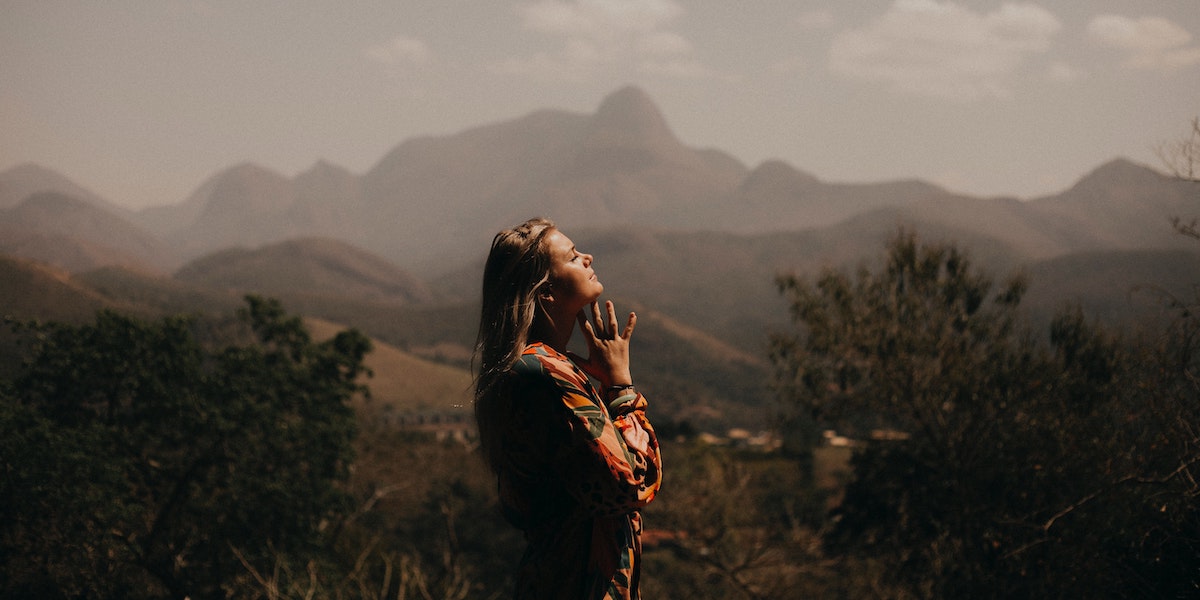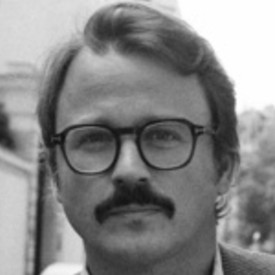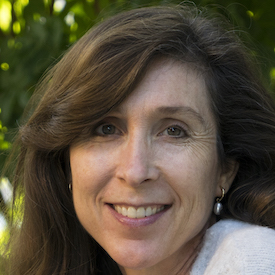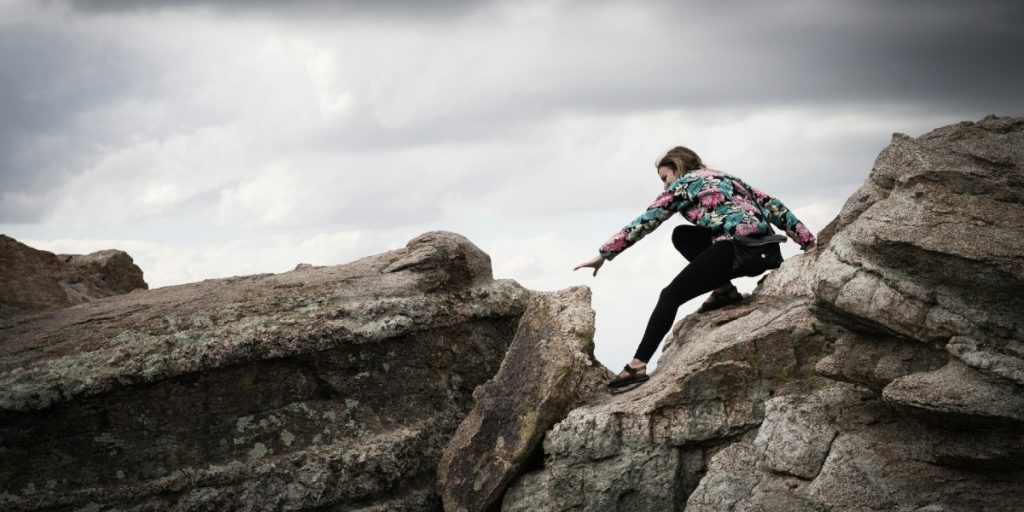The science is clear: people who engage in spiritual practices live longer, happier, healthier lives. For the past few years, two researchers—Dave DeSteno, who runs the Social Emotions Lab at Northeastern, and Lisa Miller, director of the Spirituality Mind Body Institute at Columbia—have been trying to figure out why. They’ve found that treating religious rituals as tools we can adapt to our individual needs and values can help all of us—staunch atheists and devout believers alike—live more meaningful, successful, and connected lives.
In this week’s episode of the Next Big Idea podcast, Dave and Lisa join host Caleb Bissinger to share what they’ve learned, discuss the fraught relationship between science and organized religion, and offer tips for making the most of your holiday rituals. Listen to the full episode below, or read a few key highlights.
Spirituality is about engagement.
Dave DeSteno: It’s hard to define “spirituality,” but it’s definitely different from institutionalized religion. It boils down not to a definitional issue, but to engagement. There’s a lot of research showing that people who are engaged in spiritual practices live longer, healthier, and happier lives. But it’s not enough just to say, “I’m religious. I believe in God.” If you go to services once a year for Yom Kippur or Easter, it’s not going to make any difference. It’s the regular practices, like going to services, meditation, engaging in prayers and rituals—those are the people who benefit.
What that tells me is there is some wisdom in those practices that help us meet the challenges of life. We can’t answer the question of, “Were those given to us as divinely inspired by a god, or is that the result of people just trying to figure stuff out through the millennia?” Science can’t answer that. But it can tell us that engaging in these practices makes life better, and we should figure out how and why. We’ve done it with meditation, but it can’t be the only one. The question to me is always, “What’s the next mindfulness?” It’s out there if we’re willing to look.
There’s no test to find the fingerprint of God.
Dave: Science is not anywhere near answering whether there is a true soul or spirituality or connection to God. I don’t say that there’s not. The things we’re finding in quantum physics now, no one would ever have predicted 20 years ago. For me, the more urgent question is, “What’s going on here and now?” There is no test for the fingerprint of God. Let’s not worry about that, because scientists and religious thinkers care about the same thing: making life better for everyone. So let’s look at these practices, how they deal with things like better mental health, better engagement in life, finding meaning, finding joy, reducing grief—let’s figure out what we can learn from that.
The analogy I always use is the pharmaceutical companies. They have wonderful technology, but they didn’t know where to look for some drugs. So they sent explorers into traditional cultures to look for traditional cures. A lot of them didn’t work, but some did. And from the ones that have worked, we found wonderful medications to fight lymphoma and other cancers and diseases.
I think we need to do the same with spiritual practices. You don’t have to give up science; use your empirical lens, but do it in a respectful way. See how religious practices work and why. Then comes the issue of what we can take from them. I’m not saying that we should culturally appropriate them—if you’re a Catholic, I’m not going to say, “Start sitting Shivah.” But you find lots of convergences in the nature of the practices across different faiths, and if you extract from them the principles they bring forth—the way the body is used, the way symbols are maintained—you can use that as a source of wisdom without copying the actual theology.
“Scientists and religious thinkers care about the same thing: making life better for everyone.”
I think there’s huge potential to learn from millennia of people thinking about how to help their flocks meet the challenges of life. And if we don’t take that seriously, we’re reinventing the wheel at a slower rate, rather than standing on the shoulders of other people who have come before us.
The changing nature of faith in America.
Caleb Bissinger: 2020 was a watershed year. For the first time ever, the majority of Americans chose not to be part of a church, synagogue, or mosque. There are obviously plenty of valid reasons to not want to participate in organized religion. But I would love for you to talk about what is lost when people are disengaged from any sort of transcendent, communal experience, the kind that religion typically offers.
Lisa Miller: If you envision two overlapping circles—a Venn diagram—the intersection of religion and spirituality is where about two-thirds of Americans still identify. They say, “I am spiritual, and I am religious. My transcendent experience, my spiritual life, is held in the prayers, the texts, the tradition, the ceremonies, and my people.” Two-thirds of millennials, and then fewer with each older generation, say, “I am spiritual, but I am not religious. For me, spirituality is experienced in art, in nature, and with my family.” And there’s a very small number of people who say, “I’m religious, but I don’t know what you mean by the spirituality thing.” Most people identify as being spiritual in some way. So the transcendent relationship is foundational to how we’re wired.
Dave: Yeah. And as you said, there are lots of good reasons to leave traditional faiths: institutional failures, abusive scandals, gender discrimination in terms of what they’re allowed to do and how they’re allowed to participate.
But religion provides these spiritual practices and tools, and I think the way to think about it is in the nature of the practices themselves. Richard Dawkins, who’s probably the most strident New Atheist around, will tell you that if you want to find the way to cure COVID, science is your friend. But if you want to find the best way to kill the most people, science is still your friend. Similarly, spiritual tools can move us and heal us and make us do things that are wonderful—or things that are horrible. It depends upon the intentions of who wields them. But on average, people who engage in these practices live longer, healthier, happier lives. And so the people who are leaving organized religion aren’t becoming strident atheists—as Lisa said, most of them are looking for new ways to be spiritual.
The problem is, if you start trying to find your own personal exact mix—“I like 30 percent of Hinduism with a few Jain rituals, and let me throw in an extra Christian baptism”—you begin to get a package that is so tailored to you that it’s hard to find a community. And one of the ways that religion really helps people is through the building of community. So I think people are hungry, and they’re looking for this spiritual connection. How to best shape that in this world is a question that I think science can help with, not in terms of the theology—theology is what people are going to believe—but in terms of how to engage with these practices in rapidly changing environments.
“There’s walking the walk, living out spiritual values; and then there’s talking the walk, being transparent about one’s own spirituality.”
Lisa: But whatever you do, include your child. Going through childhood and emerging adolescence into adulthood, we are in a highly formative period. We’ve found that there’s 90 percent stability from the time we exit college to the time that we’re 30 or 40, so if you want a child who is healthy and has this deep spiritual connection for the rest of their life, it can be formed with far more ease if you cultivate it in the first two decades of life. This has been seen no matter what faith tradition we’re from, or whether we’re spiritual but not religious. It’s the intergenerational transmission of a spiritual perception that profoundly shapes the child’s spiritual core.
Parents say to me, “Well, how do I do that?” There are two pieces: there’s walking the walk, living out spiritual values; and then there’s talking the walk, being transparent about one’s own spirituality.
Why spiritual rituals are more powerful than life hacks.
Dave: I use this term that I borrowed from Krista Tippett—“spiritual technologies.” These practices do things. They leverage our physiology. They leverage our mind in ways that we’re not even aware of. One of my favorite examples is mourning rituals. Everybody, at some point in life, has to deal with losing people that you care a lot about. What’s one thing that all of our religious rituals do for mourning people? Eulogize. That seems pretty normal because we all do it, but if you think about it, it’s really strange. Because if I just lost my wife, I wouldn’t want to think about how wonderful my wife was, because it would make the pain worse. Yet when people pass, we think about how wonderful they were, and we eulogize them. One of Lisa’s colleagues, George Bonanno, has done wonderful work showing that people who form positive memories of those they have lost have the best outcomes in terms of grief and mourning.
Then if you look at rituals like Shivah, they add in all these wonderful elements. People come together during those seven days in groups of ten called minyans. What happens there? There’s synchrony. They recite prayers together, possibly sway together. That builds compassion and empathy. They cover mirrors. Why do you cover mirrors? Well, there’s work showing that when you look into a mirror, whatever emotion you were feeling is intensified. If you’re sad, you’re going to feel sadder—so covering mirrors reduces grief. People sit on low stools or on the floor, which causes back pain. But then they get up to welcome other people, which relieves it. There’s new neuroscientific evidence showing that mild onsets and offsets of discomfort reduces grief and rumination.
And so what you see built into these practices is wisdom and leveraging the wiring of the body, which nudges us toward outcomes that help us deal with challenges in sophisticated ways—much more sophisticated than the “life hacks” you’re going to find on Twitter.
“People who form positive memories of those they have lost have the best outcomes in terms of grief and mourning.”
Not all rituals are created equal.
Dave: In Silicon Valley, ritual design firms are the hot thing right now. I have friends at Harvard who’ve done these wonderful studies—they’ll create a simple ritual for participants, where they tap their forks and move their food around before they eat it. It gives you a sense of control and less anxiety.
But is that the best ritual for that purpose? No. You have to look at these thousands of years when these practices have been refined. The ones that last are the ones that work. Now, that doesn’t mean that the ones that exist speak to everyone. But find one that speaks to you, and use it—because you can’t argue with the data. The institutions can cause problems, but the practices, when done right under appropriate guidance, tend to enrich people’s lives.
How to make your holiday rituals meaningful.
Caleb: We are headed into the holiday season, and people will hopefully have the opportunity to spend time with friends and family. What would your advice be for making that experience as meaningful as possible?
Lisa: Family is beautifully orchestrated to prepare us for the broad range of characters we meet in life. You’re actually fortunate if your brother has low emotional intelligence, because when you meet someone in the world with low EQ, you’ll be prepared to work with them. And you’re fortunate if you have a controlling and dominating mother, because you will find a boss who is controlling or dominating. It’s the perfect preparatory field, the laboratory for life. And from a spiritual perspective, one might say, “Thank you to my higher power”—whatever that may be—“for this family, that I might realize all that you intend for me.”
Dave: Let’s say you go to church on Christmas. While you’re there, really think about it. The key to accessing the tools and benefits that these rituals give you is the intention. So engage with it—feel the music, enjoy the ceremonies. And if you do, my sense is that you will find some sense of joy, some sense of deep connection. And if you don’t? Well, then maybe you need to find a different tradition, and that’s fine, too.
Lisa and I have slightly different views, but we both fundamentally agree that spirituality is good for people’s health and well-being. So, see how it feels—try to find new ways to bring it back into your life.
To enjoy ad-free episodes of the Next Big Idea podcast, download the Next Big Idea App today.































